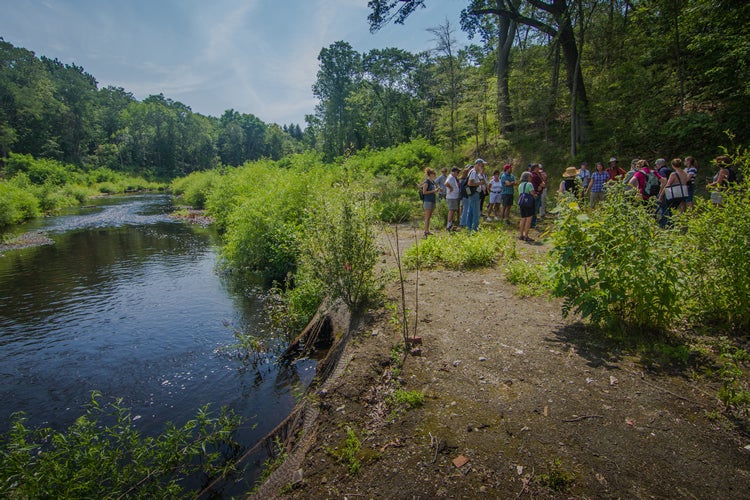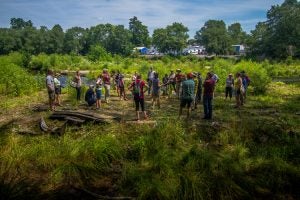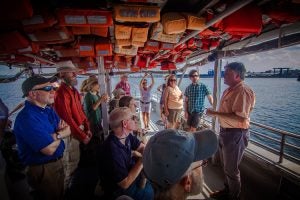Art Gold, PhD, Professor and Chair of Natural Resources Science Department and co-chair of the Masters of Environmental Science Management Program at the University of Rhode Island

Each year, the Coastal Institute hosts a field trip for its Senior Fellows, a group of over 120 professionals in science research or career fields with a coastal science nexus. The group is diverse, represented by a range of career stages from entry-level to retired-yet-still-immersed in science; a variety of institutions from academia to state and federal agencies to nongovernmental organizations; and a spectrum of experience including ecology, public policy, science communication, and land-use planning. The multidisciplinary list goes for professionals linked together by their focus on coastal zones from continental shelves to the upland watershed.
This year, the trip took us to Taunton, Massachusetts, to visit dam removal sites as part of a Mill River restoration effort followed by a boat tour of the upper Narragansett Bay and Seekonk River to learn about the challenges facing urban waters.
The tour of the Hopewell Dam removal site on state hospital property in Taunton was a rich illustration of the social, ecological, and economic concerns that are at play when dams are removed.
The Massachusetts Division of Ecological Restoration did an exemplary job of working with neighbors who were initially opposed to dam removal because they would lose the “lake” view from their homes. The Ecological Restoration staff worked to educate the public about the lost river and went about removing the dam in a manner that responsibly disposed of the contaminated sediments that had built up over the years all the while staying true to the natural environment by planting local vegetation and recreating the historic stream bed. Underlying all of this work was the added benefit that removing the dam reduced the risk of flooding in downtown Taunton, which in recent years had cost the city dearly as people were evacuated and local businesses temporarily closed.

And, the benefits can already be seen.
River herring that had not been seen in close to two centuries moved up the river to spawning grounds as soon as the dam was removed—they were literally captured by an underwater camera within an hour. Fish have been blocked from this river since the dam was built almost 200 years ago. Sea lampreys moved into areas where they had not been seen in recent memory and immediately set to work building nests of river rocks, which naturally aerated the waters. Adjacent homes still have a natural view, though it is of a river and more vegetation than before. People are thrilled to have new neighbors in the form of diverse species.
This visit was particularly timely for an interdisciplinary group of us researchers from the University of Rhode Island and the Rhode Island School of Design. We were recently awarded a National Science Foundation grant to address the future of dams in New England. The $6 million project includes partners in Maine and New Hampshire. We will address a range of future approaches to dams, including removing aging dams to restore fisheries or reduce safety risks and potentially maintaining or expanding a set of hydropower dams. By examining economic, environmental, and social trade-offs, the project will help individuals and communities make better decisions about dams.
This proposal was submitted as a Coastal Institute project, which will allow us to have access to more resources to add value to the project, a benefit of serving as a Coastal Institute Senior Fellow.
Over lunch, Senior Fellows had the opportunity to connect with each other and discuss current and potential collaborations. While some Senior Fellows have a long track record of working together, others have only seen each other’s names on email lists. This event provided an opportunity for face to face discussions, which are key to the establishing of interdisciplinary working relationships. Lunch also served as a business meeting and Coastal Institute director Judith Swift updated the Senior Fellows on many of the initiatives, projects, outreach, and research recently completed or currently ongoing at the Coastal Institute.

For the afternoon, we boarded the Save The Bay R/V Alletta Morris and changed our perspective from the land-based watershed to the urban coast including the Port of Providence, the Fox Point Hurricane Barrier, and the Seekonk River. Climate change poses specific challenges to these areas such as how to prepare for sea level rise, more frequent intense storms, and low oxygen events that can kill fish of which there was a sad reminder as we viewed scores of menhaden belly up or flopping in the throes of oxygen deprivation.
Once again, the Coastal Institute Senior Fellows trip was a highlight of my summer. Visiting specific sites in the bi-state watershed provides a unique–and enjoyable¬–opportunity to learn about restoration and management efforts, and meet or reconnect with professionals in the field. Most importantly, it serves as a reminder of the basic inquisitiveness that inspired me to become a research scientist.

